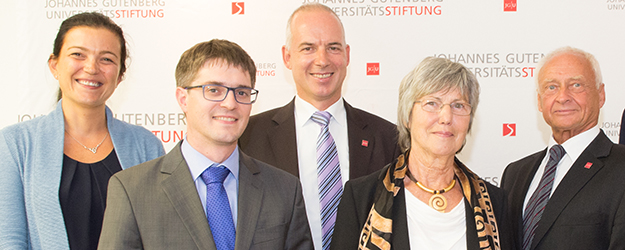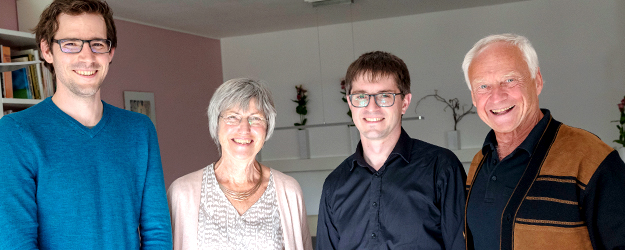18 July 2018
For twelve years now, Dr. Elke Göbel and Dr. Rainer Göbel have supported Johannes Gutenberg University Mainz in many different ways. Now the husband and wife, both Gutenberg alumni, have set up a foundation that they plan to use first and foremost to promote international students in the Faculty of Physics, Mathematics, and Computer Science.
It was in August 2017 that Dr. Elke Göbel and Dr. Rainer Göbel established a new foundation, named after them, and soon afterwards already presented the first award. They gave young physicist Johannes Roßnagel a prize for his outstanding dissertation "A Single Atom Heat Engine". "We intended to get off the ground quickly," recalls Rainer Göbel. "But we also wanted to focus on quality." The couple have managed to achieve both brilliantly. Roßnagel's research and his contribution to the field published in the eminent journal Science attracted international attention. It is a rare thing for doctoral candidates to see their work accorded such prominence.
Meanwhile, Johannes Roßnagel has completed his doctorate and is now paying a visit to the Göbels. "I really looked forward to coming here," he says. "I was delighted to win the award, it was a wonderful surprise." A lively conversation quickly gets underway between the three academics. After all, Elke and Rainer Göbel are themselves physicists with doctoral degrees. Both studied at JGU.
The Association of the Friends of Mainz University
"We have close links with Johannes Gutenberg University Mainz," Elke Göbel emphasizes. The latest expression of this bond is their foundation, the Dres. Elke und Rainer Göbel-Stiftung. Twelve years ago, the couple began to support the university to the best of their ability. "Back in the day, we attended the lectures held by Anton Zeilinger, holder of the Johannes Gutenberg University Endowed Professorship," remembers Rainer Göbel. "He was absolutely inspiring." The Endowed Professorship was established in 2000 by the Association of the Friends of Mainz University, their aim being to invite prominent researchers and academics to JGU on a regular basis. "And that is how we came across the Friends of Mainz University. And we thought it a good thing. So we joined them."
The couple quickly became involved in the various activities of the association and would soon begin doing a great deal more. "We support the JGU School of Music, but also the Studium generale and its exceptional team. We are often invited to concerts, lectures, and other events, and this helps us to glean a great deal of benefit from all that JGU has to offer." Since its founding in 2011, the Göbels have also been involved with the Deutschlandstipendium scholarship, funding several annual grants. For each grant, donors contribute EUR 1,800 to this kind of scholarship, the German Federal government provides the same sum. This means private individuals can see that their donations are really effective.
"Last year we thought about establishing our own foundation," Rainer Göbel continues. "We do not have millions to give, but we can donate and support from what we manage to save from our income. We first got in touch with the university to ask them if there was any point in doing this. The answer came back promptly: 'Of course it's worth doing!' they said."
A contemporary endowment fund
The new foundation was established as an endowment fund that operates under the auspices of the Johannes Gutenberg University Foundation. "They do almost all the work for us there," says Elke Göbel. "There are exceptional people working for the University Foundation whom we can trust completely."
The University Foundation also approved the idea of establishing an endowment fund. "That seemed to make sense, especially in light of the current low interest rates," Rainer Göbel clarifies. "We can make use of up to ten percent of our endowment capital every year, which means we don't have to rely solely on investment income. As a result, we were able to get started straight away."
Through their foundation, the couple plan to support JGU's Faculty of Physics, Mathematics, and Computer Science. As it was here that they themselves obtained their academic training, the couple feels a special connection. The Foundation Advisory Committee, whose members include the Dean of the Faculty, the General Director of Physics, and the JGU Chancellor, are backing the project. At present, these are Professor Concettina Sfienti, Professor Patrick Windpassinger, and Dr. Waltraud Kreutz-Gers.
"It was Professor Sfienti and Professor Windpassinger who nominated Johannes Roßnagel for the award," clarifies Rainer Göbel, looking over at the young physicist. "They pointed out that his research was truly extraordinary. And as I have already said: We care about quality."
The smallest thermal engine in the world
As a member of the Quantum, Atomic, and Neutron Physics (QUANTUM) group at the JGU Institute of Physics, Roßnagel created a thermal engine from a single calcium atom. "In principle, what we have done is to use differences in temperature to generate mechanical energy and scaled this down to the atomic level," Roßnagel explains. "We were not concerned with achieving a particularly high output, instead what we really wanted to demonstrate was that this was actually possible on this scale."
In a so-called Paul trap, the calcium atom begins to oscillate as a result of being alternatively heated and cooled. "We also wanted to show that heat can be harnessed for applications in our field. Usually everything is always cooled down in our experiments. Now we can generate mechanical energy using heat." The smallest heat engine in the world fulfilled all expectations. And Roßnagel became the first person to win the Göbel Foundation award.
"This prize was only the start," says Rainer Göbel. "In the future, we hope to be funding international students, too. The JGU Executive University Board is in favor of this and we are happy to run with the idea."
More presence, more relevance
At this moment, only a short time after its establishment, the Göbels are thrilled by the response to their commitment. "The foundation gives us a very different presence to the one we would have if we only made one-off donations," says Rainer Göbel. "There is also greater relevance to scholarship and research. And an endowment fund gives us the opportunity to continue to experience it all and contribute towards the direction these take. We do not intend anyone to ask in 30 years: 'Who exactly were those Göbels with their foundation?'. We want to be active right now."
Elke Göbel adds: "We are often approached by friends now, who tell us: 'We really like the way you have decided to set up a foundation. We want to do that as well.'" The Johannes Gutenberg University Foundation offers many different ways of contributing and participating and is open for all ideas and enquiries.



